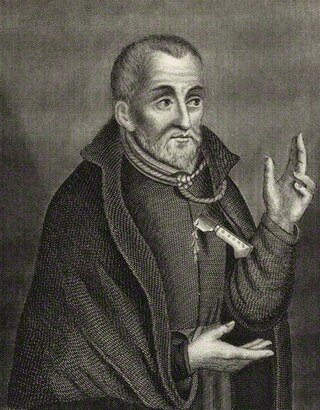Related Research Articles
Sir Charles Harding Firth was a British historian. He was one of the founders of the Historical Association in 1906. Esmond de Beer wrote that Firth "knew the men and women of the seventeenth century much as a man knows his friends and acquaintances, not only as characters but also in the whole moral and intellectual world in which they lived."

Edmund Campion, SJ was an English Jesuit priest and martyr. While conducting an underground ministry in officially Anglican England, Campion was arrested by priest hunters. Convicted of high treason, he was hanged, drawn and quartered at Tyburn. Campion was beatified by Pope Leo XIII in 1886 and canonised in 1970 by Pope Paul VI as one of the Forty Martyrs of England and Wales. His feast day is celebrated on 1 December.
William John Hamilton was a British geologist who served as a Conservative Member of Parliament.

Edmund Brisco "Henry" Ford was a British ecological geneticist. He was a leader among those British biologists who investigated the role of natural selection in nature. As a schoolboy Ford became interested in lepidoptera, the group of insects which includes butterflies and moths. He went on to study the genetics of natural populations, and invented the field of ecological genetics. Ford was awarded the Royal Society's Darwin Medal in 1954. In the wider world his best known work is Butterflies (1945). Ford was a member of the UK Eugenics Society, of which he was a council member in 1933-1934, also contributing to its publications.

Sir Edward Bagnall Poulton, FRS HFRSE FLS was a British evolutionary biologist, a lifelong advocate of natural selection through a period in which many scientists such as Reginald Punnett doubted its importance. He invented the term sympatric for evolution of species in the same place, and in his book The Colours of Animals (1890) was the first to recognise frequency-dependent selection. He is remembered for his pioneering work on animal coloration and camouflage, and in particular for inventing the term aposematism for warning coloration. He became Hope Professor of Zoology at the University of Oxford in 1893.

Alexander Craig "Alec" Aitken was one of New Zealand's most eminent mathematicians. In a 1935 paper he introduced the concept of generalized least squares, along with now standard vector/matrix notation for the linear regression model. Another influential paper co-authored with his student Harold Silverstone established the lower bound on the variance of an estimator, now known as Cramér–Rao bound. He was elected to the Royal Society of Literature for his World War I memoir, Gallipoli to the Somme.
Sir Charles Alexander Fleming was a New Zealand geologist, ornithologist, molluscan palaeontologist and environmentalist. He spent the last twenty years of his life studying the evolution and systematics of New Zealand cicadas.

Thomas Ford, a Devonshire native, was a Catholic martyr executed during the reign of Elizabeth I.

The Great Ejection followed the Act of Uniformity 1662 in England. Several thousand Puritan ministers were forced out of their positions in the Church of England following the Restoration of Charles II. It was a consequence of the Savoy Conference of 1661.

Sir Charles Scarborough or Scarburgh MP FRS FRCP was an English physician and mathematician.

Charles Moss was an Anglican clergyman who served as Bishop of St David's from 1766 to 1774 and Bishop of Bath and Wells from 1774 to 1802.
Edmund Frederick Robertson is a British mathematician who is a professor emeritus of pure mathematics at the University of St Andrews.
Edmund Goodenough (1786–1845) was an English churchman, dean of Wells from 1831.

Sir Edmund King (c.1630–1709), also Edmund Freeman, Edmond King, was an English surgeon and physician. He is known as an experimentalist, and also for his attendance on Charles II of England.
References
- ↑ "Obituary: Charles Ford". The Independent .
- ↑ ‘FORD, Charles Edmund’, Who Was Who, A & C Black, an imprint of Bloomsbury Publishing plc, 1920–2016